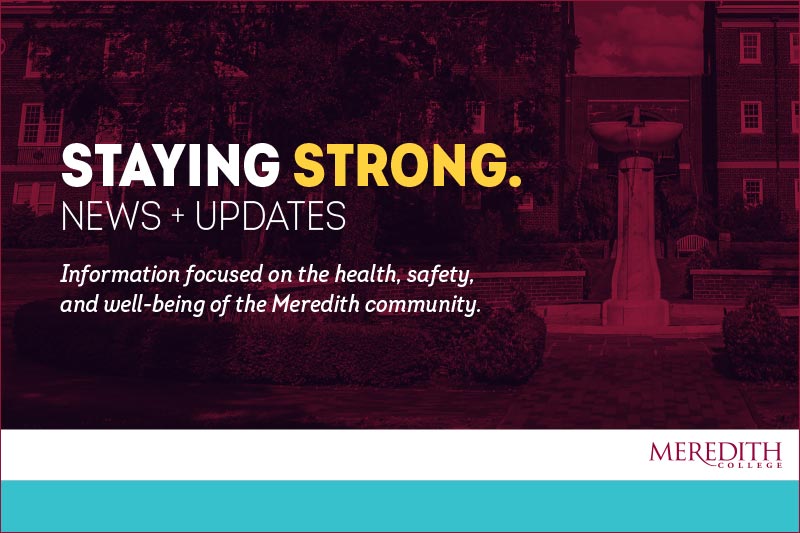Staying Strong Reminder: How Does Contact Tracing Work?
- Published

As Meredith’s fall semester nears its end, the Incident Response Team wants to remind faculty and staff how contact tracing works.
Contact tracing is the process used to identify anyone who may have come into contact with a COVID-19 positive person. Anyone with a COVID-19 positive test will be asked where they have been and with whom they have been in contact while they may have been contagious. Contact tracing is confidential, and both FERPA and HIPAA regulations restrict what information can be shared about any case. For more details, visit the NC Department of Health and Human Services website.
To prevent the further spread of disease, people who had contact with someone with COVID-19 are asked to not come to campus, to stay home, and maintain social distance (more than 6 feet) from others in their home until 14 days after their last exposure to a person with COVID-19. Contacts should monitor themselves for any new or emerging symptoms including monitoring their temperature twice daily.
How does Contact Tracing work at Meredith?
Meredith College has collaborated with the Wake County Health Department to develop appropriate protocols for case management and contact tracing for cases that may occur on campus.
All contacts received by the College that indicate an exposure to COVID-19 will be immediately traced by trained contact tracers from our campus; separate contact tracing teams have been established for students and employees. This process will be managed by Human Resources (for employees) and the Student Health Center (for students).
Anyone at Meredith (employees and students) who is identified as having had primary contact (within six feet for more than 10 minutes) with someone who has tested positive with COVID-19 will be contacted by Meredith’s contact tracing team. External community contacts (off-campus) will be managed by the Wake County Health Department.
What Should you do if a Student or Employee asks for accommodations in order to quarantine?
If a student or employee shares that they have possibly been exposed or have tested positive, refer them to the Student Health Center (students) or HR (employees). Please do not ask them additional questions.
A natural reaction may be to ask questions, but HR and Student Health Services would like to remind employees that the College’s contact tracing processes are in place in order to protect the health of our community and student/employee privacy. By asking questions directly, you may put the student or employee in a position where they feel compelled to share and that could create issues. The processes are in place to protect the personal health information of the individual and to protect the faculty member or supervisor from any accusations of bias. Please contact HR, Student Health Services, or the Dean of Students with questions but also remember that Meredith has set up its face-to-face classrooms and office capacity limits to maintain appropriate physical distance. In most cases, we are not seeing spread of the virus from classrooms or offices because of the precautions we have taken. If you maintain at least a 6-foot distance at all times and wear your face covering, the possibility you’ll be identified as a direct contact is considerably low.
How can Meredith community members help?
Most importantly, anyone with symptoms, who has been exposed to a known positive, decides to be tested, or has tested positive with COVID-19 should notify the College so that contact tracing can begin. Employees must not come to campus, remain at home, and contact Human Resources. Students who are diagnosed with COVID-19 should contact the Student Health Center. For contact tracing to work successfully, it is important for any campus community member called by the contact tracing team to answer their phones and respond to all questions.
We asked the campus community to remain vigilant and take necessary precautions, including the Three Ws. North Carolina and the United States overall are seeing a rise in cases because people are growing complacent and moving activities indoors as the seasons change.
Additional resources: What to do after testing document from NCDHHS
News Director
316 Johnson Hall
(919) 760-8087
Fax: (919) 760-8330
PRINCETON REVIEW
U.S. NEWS
NICHE
3800 Hillsborough Street Raleigh, NC 27607-5298 | (919) 760-8600 Fax: (919) 760-8330 | © 2024 All Rights Reserved.